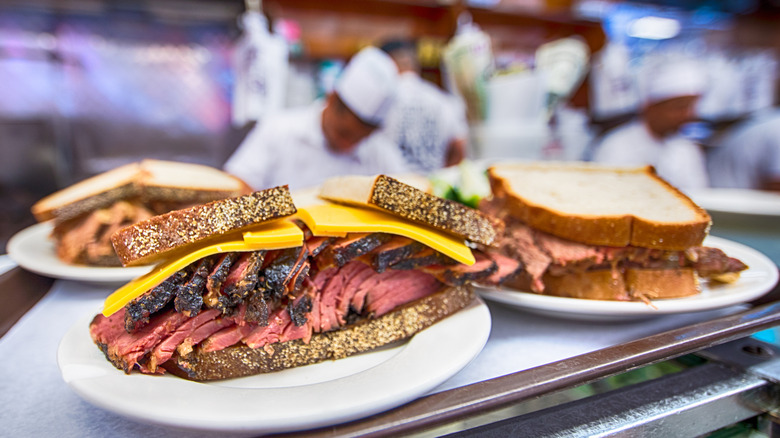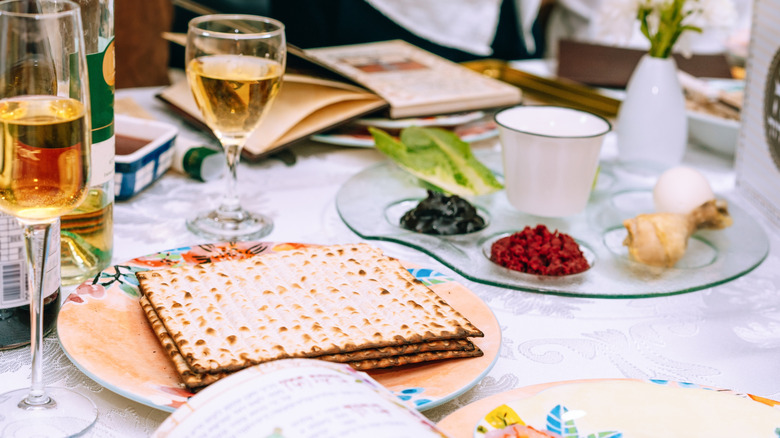Katz's Deli Will Make You A Passover Meal, But There's A Huge Catch
Iconic New York deli Katz's is known for a lot of things. Mile-high pastrami sandwiches, Jewish specialties like matzo ball soup and knishes, being Anthony Bourdain's favorite late-night spot, and the "I'll have what she's having" scene from "When Harry Met Sally..." (and the Harry and Sally Super Bowl reunion) are among them. It's also become such an institution that you can order its delicious food from anywhere in the U.S. and it will be shipped to your doorstep.
Katz's offers an elaborate Passover dinner that feeds 6-8 people and is available for shipping in time for the high holiday; it includes brisket, gravy, gefilte fish, matzo ball soup, potato kugel, and honey cake. However, there's a major caveat you should know if you are thinking about ordering it for your holiday. A bold and red note on Katz's website states, "This package contains traditional Jewish delicacies to celebrate Passover, however please note that Katz's products are not certified kosher, nor are they kosher for Passover."
If you keep a kosher household, or even if you just keep kosher during the Passover holiday, this offering from Katz's isn't going to be up to your standards. Some of it has to do with Katz's lack of certification overall, and some of it is because of the ingredients used in some of the items in the Passover dinner bundle. Let's get into it.
Why isn't Katz's Deli kosher?
Kosher certification is a very serious standard. There is a set of dietary guidelines called Kashrut that govern the way observant Jews eat and prepare their food. Those who keep kosher observe these rules in their daily lives. And restaurants that claim to be kosher must be certified by a third party and must, in the state of New York, register with the New York State Department of Agriculture and Meats.
According to Kashrut, it is off-limits to consume some animals, and the ones that you do consume must be killed and prepared according to Jewish law. Katz's explicitly says that its food is not kosher and that its meat is prepared in-house, likely meaning that it is not sourced from kosher butchers and not prepared according to Kashrut.
Another kosher standard is not eating meat with dairy and using separate utensils for meat and dairy. In true kosher kitchens, this means having separate sets of utensils for handling meat and dairy products. Katz's deli serves sandwiches that combine meat and cheese, including a reuben sandwich, which has corned beef, Swiss cheese, sauerkraut, and its signature reuben dressing. This may sound yummy, but the fact that beef and cheese are served together and most likely prepared on equipment and with utensils that handle both meat and dairy, makes Katz's unsuitable for those who keep kosher.
Why isn't Katz's Deli kosher for Passover?
The rules of keeping kosher during the week-long Passover holiday are even more restrictive and complex than the daily standards. It helps to know a little bit about the holiday to understand. Passover is a celebration of the Jews' emancipation from Egypt. To keep kosher for Passover, one must avoid all leavened food for all eight days, meaning bread, pasta, cookies, anything made with grains like wheat, barley, or rye and water that has risen. Instead, kosher Jews eat matzo during Passover for a symbolic reason; it is what the Jews ate when they left Egypt and wandered in the desert.
Needless to say, Katz's sandwiches are served on bread, making them not kosher for Passover. In the Passover meal available for shipping, there is a honey cake included. While it's unclear exactly what ingredients are in Katz's honey cake, the deli specifically states that the meal is not kosher for Passover, so there is a chance the honey cake is made with wheat flour. Additionally, as mentioned earlier, Katz's meat is not certified kosher, meaning the brisket in the Passover bundle most likely isn't kosher either.
This mail-order meal could be a good option if you're not worried about keeping kosher but would still like to celebrate Passover with a somewhat traditional meal. But if you're serious about keeping kosher in general, or even just kosher for the holiday, you may want to look elsewhere for your Passover food or prepare Passover food yourself at home.


